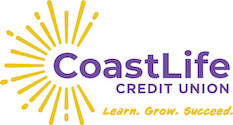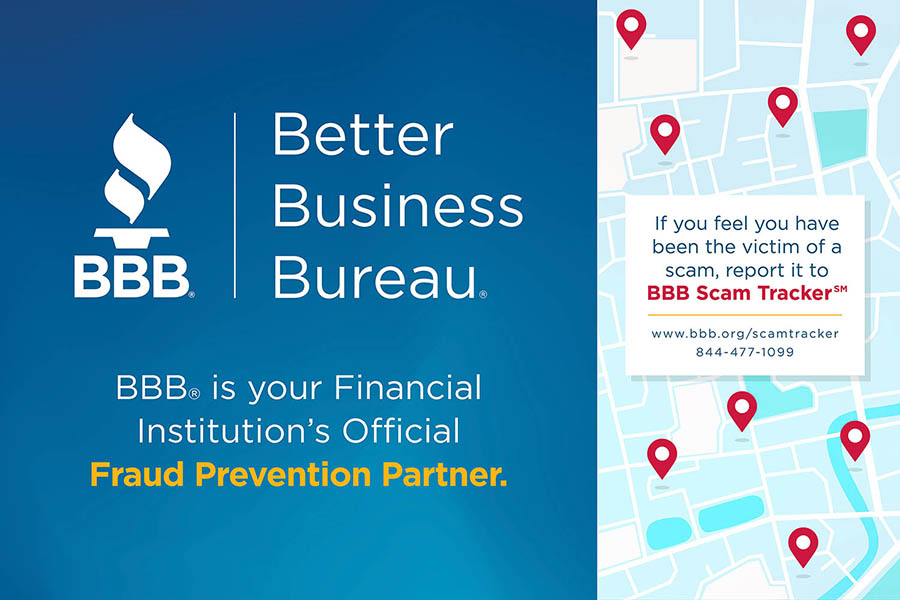Security Awareness
Online Security
There are several levels of protection in place to safeguard your information on Web-24 (Online Banking). When you enroll in Online Banking with CoastLife CU, you're required to establish a personal identificatin number (PIN). Once that's established and upon initial login, you'll be asked to setup a user name and security questions as well as an email address and cell phone number. Then, each log-in will require a 'verification code' that, at your direction, will be sent to you via email, text or phone call. If logging in through your personal computer, this last step can be avoided on future logins by registering your computer. It's highly recommended by CoastLife CU that you not register any computer that is not your own...office computer, etc.
Mobile Security
CoastLife CU's mobile app provides you with the same protection as our Web-24 (Online Banking) service. The security questions that you set up upon initial log in will be asked and the same verification process will occur. You'll also be logged out of the mobile app after a period of inactivity so your account information will remain safe should your phone be lost or stolen. It's recommended that you lock your phone with a passcode as additional protection.
Online Safety
Online transactions are considered EFT transactions. The term 'electronic fund transfer' (EFT) generally refers to a tranasction initiated through an electronic terminal, telephone, computer, or magnetic tape that instructs a financial institution to either credit or debit a consumer's asset account. Please refer to our general account disclosures for liabilities, rights and responsibilities under Regulation E for EFT transactions.
Home Computer Security
The following items are strongly urged for secure online banking and to protect your personal computer data:
- Update your passwords on a regular basis, or at least every 20-30 days
- Confirm firewalls, anti-spyware, and anti-virus software are installed on your home computer. Update and run them frequently.
- Consider getting a personal firewall on your computer.
- Do not click links inside spam email.
- Do not download or install software without verifying the source.
ATM Security
When using an ATM or night deposit facility, you should exercise discretion. For your own safety, be careful.
- Be aware of your surroundings, particularly at night.
- Consider having someone accompany you when the ATM or night deposit facility is used after dark.
- Close the entry door of any ATM facility equipped with a door.
- If another person is uncomfortably close to you at the time of your traansactio, ask the person to step back before you complete your transaction. If it's after the regular hours of the financial instutiion and you're using an ATM, do not permit entrance to any person you don't know.
- Refrain from displaying your cash at the ATM or night deposit faciity. As soon as your transaction is completed, place your money in your purse or wallet. Count the cash later in the safety of your car or home.
- If you notice anything suspicious at the ATM or night deposit facility, considering using another ATM or night deposit facility or coming back later. If you're in the middle of a transaction and you notice something suspicious, cancel the transaction, take your card or deposit envelope and leave.
- If you're followed after making a transaction, go to the nearest public area where people are located.
- Don't write your personal identification number (PIN) or access code on your Debit/ATM card.
- Report all crimes to law enforcement officials immediately. If emergency assistance is needed, call the police from the nearest available public telephone.
- If your card is lost or stolen, pleae report it immediately by calling 361/985-6810 or after hours at
- Debit Card 800/528-2273
- Credit Card 800/558-3424
Contact by the Credit Union
There may be times in which CoastLife CU will need to validate account information that may be suspicious or incorrect. We may contact you under these circumstances, but please be aware that these types of calls are often copied by fraudsters seeking personal data (refer to Phishing). Circumstances to which you will be contacted on an unsolicited basis:
- Suspicious account , debit card or loan activity
- Account error
Methods of contact:
- Telephone
- In person
Business Accounts
It is strongly urged that business accounts perform their own periodic risk assessment and may contact the Credit Union for further validation on any questions or activity.
Scams/Fraud
Phishing
Phishing scams are an attempt to obtain your personal information by disguising as a trustworthy source. These scams can be an email or pop-ups. If you feel you've been a victim of phishing and that your CoastLife CU account has been compromised, contact the Credit Union immediately.
Tips to Avoid Becoming Victim
- Do not follow unsolicited web links
- Do not open attachments in an email message from an unknown source
- Make sure your antivirus is up-to-date
Smishing
Smishing is short for SMS phishing. It's a variant of phising but instead uses Short Message Service (SMS) systems to send text messages. These messages typically seek to direct you to visit a website or call a phone number at which point you'll be enticed into providing sensitive information. They tend to use fear to elicit a response such as fear that your account has been blocked or suspended.
- CoastLife CU does not use text messaging. If you receive a message claiming to be on behalf of CoastLife CU, contact the Credit Union to verify.
- Beware of messages that say its from '5000'. Scammers will sometimes mask their identity by using email-to-text services so that their actual phone number is not revealed.
- Never reply to a suspicious text without doing research and verifying the source first.
Identity Theft
Identity theft is when someone uses your personal information to obtain credit or other services. It can happen to anyone but there are a few things you can do to reduce your risk.
- Be aware of the signs. Signs include credit or debit charges you don't recognize, bills for accounts you didn't open, and IRS notices that say you filed multiple returns.
- Keep your financial information secure whether on paper, online or on your computer or mobile devices.
- Use Identity Theft Protection Services. CoastLife CU offers the Advantage Benefit Package that can be added on to your checking account for a small monthly fee. It comes with an Identity Theft 911 and Identity IQ services that will provide daily monitoring and assistance should you become a victim.
- If you're concerned about identity theft, you might consider placing a credit freeze on your report. This would entail contacting all three credit reporting agencies (Exeperian, Equifax and TransUnion). This will prevent a credit report company from releasting your credit report without your consent. Keep in mind that this may delay, interfere or even prohibit the timely approval of any subsequent request or application you make.
Spoofing
Scam callers often use call spoofing technology to disguise the number they are calling from so the call appears to be from a legitimate business or place such as CoastLife Credit Union. If you are contacted by anyone requesting personal information, you should hang up and contact us at 361-985-6810. We will never ask for your Username, Online Password or Debit Card PIN. Remember, if in doubt, contact the credit union immediately.
Reverse Mortgage
Reverse Mortgage is the conversion of your home equity into cash. Many of these offers have been linked to scams and are targeted towards seniors. Check the Better Business Bureau for legitimate lenders.
Reporting Suspicious Activity
In the event of suspicious activity or a security issue, please contact us immediately.
Spot a business or offer that sounds like an illegal scheme or fraud? Tell the BBB and warn others by reporting what you know. This helps the BBB assist law enforcement investigations into perpetrators of these schemes. Together, we can fight fraud.











